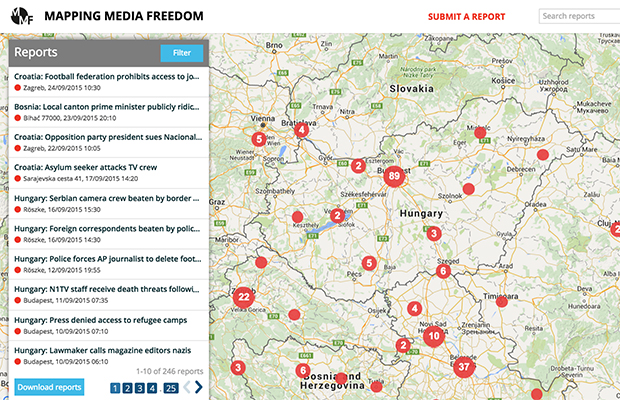At least eight journalists were beaten and three detained as they covered a clash between refugees and the Hungarian police at the border with Serbia on 16 September.
Among those attacked were Swedish photographer Meli Petersson Ellafi, Jordan Davis, a journalist at Swiss RTS, and an entire film crew working for Radio Television of Serbia. They were covering events at the Horgoš-Röszke highway border crossing, which the Hungarian authorities had blocked the day before, leaving around 2,000 refugees stranded on the Serbian side.
On 16 September, at around 2:30 PM local time, refugees attempted to break through a gate into Hungary. While most were protesting peacefully, a small number threw stones and bottles across the fence at the Hungarian riot police. The police responded with tear gas, pepper spray and water cannons.
“At some point, the riot police retreated from the fence and the refugees managed to open the gate,” Timea Becková, who works for Slovakian newspaper Denník N, recalls. Confusion followed, with many refugees thinking the Hungarian authorities would let them in, so they walked towards the riot police on the Hungarian side. Several dozen journalists on the Serbian side followed the crowd.
At around 5:30 PM, TEK, the Hungarian anti-terror SWAT unit, equipped with sidearms, helmets and face masks, started pushing the refugees back towards Serbia.
“As I was moving backwards, I stopped for a moment to help an old man who fell and risked being trodden by riot police, which is when an officer hit me with a baton,” Becková said. She repeatedly told police in Hungarian that she is a journalist, but it made no difference.
“Suddenly the TEK guys, not the riot police, started running towards us — it was mayhem,” says Warren Richardson, an Australian photographer. Despite having two cameras, he was grabbed from behind by an officer.
“Clearly he was there to beat, not to ask questions,” Richardson told Index on Censorship, adding that he was standing on ‘no mans’ land’ between Serbia and Hungary. “From there they beat me into Hungary, then took me from the border to the police station illegally. They kidnapped me.”
“Law enforcement lost control of the situation,” Becková said. While she doesn’t hold a grudge against TEK, she says the events that followed were outrageous. She was forcefully brought back to the Hungarian side — with her hands tied tightly with a plastic wrap — where she was thrown to the ground.
She was later handed over to the regular police along with Richardson, who was kicked in the head and chest, and the Polish journalist, Jacek Tacik, who suffered a head wound. They were taken to a police station in Szeged along with a number of detained refugees.
There they were questioned on suspicion of having crossed the border illegally. In addition, Becková was accused of inciting rebellion and Tacik was told he had assaulted a policeman. However, this accusation did not emerge again during his interrogation, he told Index.
During questioning, Richardson refused to cooperate. “I stood up for myself. They were making up laws. They never took my name, personal address or fingerprints,” he said.
After interrogations that lasted up to 13 hours, the journalists were released and the charges were dropped.
In a statement, the Hungarian police denied beating the journalists. “The police — in accordance with the law — used necessary and proportional force against the members of an aggressive group that was using instruments that could cause serious harm to the police protecting the border of Hungary and the European Union. The media workers stayed at their own risk in an area where the police — after a proper warning — used coercive instruments.”
Hungarian government spokesman Zoltan Kovacs said it was a surprise to find journalists among the chaos. He said that in situations like this, the safety of journalists cannot be guaranteed, therefore they should stay away. A policeman is not in the position to judge who is a troublemaker and who represents the media, he added.
The European Federation of Journalists (EFJ) has denounced the attack. “It is incomprehensible to see an EU country like Hungary constantly violating press freedom and human rights. The European Commission and international institutions must take action against these serious violations,” EFJ President Mogens Blicher Bjerregaard said.
“It is a prerequisite for EU member states to respect the EU Charter on fundamental rights which sets out standards on media freedom and freedom of expression.”
The incident was also condemned by the Committee to Protect Journalists. “We are appalled by the police violence against journalists covering this world story,” CPJ Europe and Central Asia Program Coordinator Nina Ognianova said. “The Hungarian government must make a clear and unequivocal statement that it will not tolerate such behavior.”
Mapping Media Freedom
|
This article was published on 16 September 2015 at indexoncensorship.org





